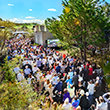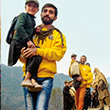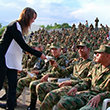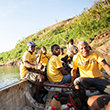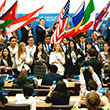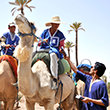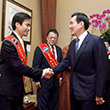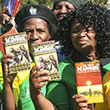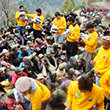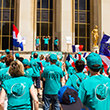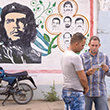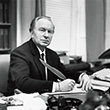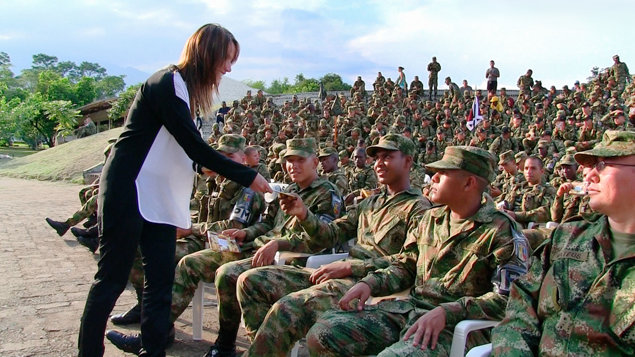For years, Colombia’s efforts to curb narcotics production have focused on Putumayo, a lush, southwestern province with a tortured history of subjugation, insurgency, violence and exile. “One day the army passes through, the next day it’s the guerrillas, and the following day it’s the paramilitaries,” a local community leader once lamented, alluding to the half-century war between the Colombian military, right-wing militias and the Revolutionary Armed Forces of Colombia (FARC), a Marxist-Leninist group that reached a peace accord with the government in September. Although Colombians narrowly rejected the historic agreement in a referendum days later, both sides have pledged to uphold the peace and work toward a final resolution.
Colombians got a hint of their nation’s transition from chronic war to relative harmony in November 2015, when a Youth for Human Rights Colombia Foundation team led by Colombian dentist Sandra Poveda and her brother Felipe Poveda arrived in the jungles of Putumayo to offer human rights training to the military. They had come at the request of Brig. Gen. Alberto Sepúlveda, commanding officer of the 27th Jungle Army Brigade, Colombia’s first U.S.-funded counter-narcotics unit.
The Foundation is part of Youth for Human Rights International (YHRI), which, in turn, is the youth component of United for Human Rights, a Church of Scientology-supported independent, nonprofit organization that has hundreds of groups, clubs and chapters around the world. The Foundation’s mission is to teach young people about human rights so that they become lifelong advocates for tolerance and peace. It was with that aim in mind that the Povedas and their team members spent 10 days training 53 instructors responsible for imparting human rights education to 12,000 military personnel and their families across Putumayo.
The Colombian military has been working with the Foundation since 2009, when the nonprofit was created with Sandra as president and Felipe as executive director (Felipe is currently the Foundation’s president.) In May that year, then Minister of Defense Juan Manuel Santos, currently Colombia’s president, inaugurated the School of Human Rights and International Humanitarian Law of the National Army of Colombia in Bogotá in the aftermath of a 2008 scandal in which rogue soldiers executed some 900 civilians in an attempt to claim bounties.
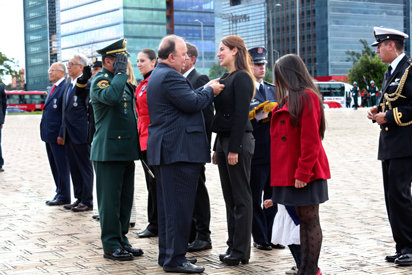
During their visit to Putumayo last year, the Poveda siblings and their teammates introduced young instructors to a booklet that is at the core of the YHRI program. Titled What Are Human Rights?, the publication describes the 30 principles enshrined in the 1948 United Nations Declaration of Human Rights, which holds that people everywhere are equally entitled to their rights to justice, education and employment.
Deep in Putumayo’s Amazonian rainforests, meanwhile, Brig. Gen. Sepúlveda was busy adding a new chapter to the Foundation’s history: he ordered his battalion to form a “human rights instruction track”—a chain of kiosks in the forest where soldiers watched an award-winning documentary film, The Story of Human Rights, which outlines the 30 principles of the U.N. Declaration of Human Rights. The kiosks also featured awareness-raising public service announcements about the 30 principles.
To bring the Declaration of Human Rights principles to life, the soldiers enacted for their peers each of the rights most relevant to their interactions with local populations. Armed with real weapons and sporting fake blood, the troops performed true-to-life scenarios in which they demonstrated the unethical and ethical ways to handle drug traffickers. According to the latest count, more than 1,600 of Brig. Gen. Sepúlveda’s soldiers have received such interactive training, which is part of the battalion’s daily schedule.
As of June 2015, more than 47,000 personnel of the Colombian National Army had participated in lectures delivered by Foundation volunteers and military instructors. In all, 300,000 members of Colombia’s armed forces, a majority of active frontline personnel, have been trained in humanitarian issues, according to figures that Lt. Col. Anstrongh Polania, chief of the Department of Joint Operational Law in Colombia’s Ministry of Defense, provided to the Foundation.
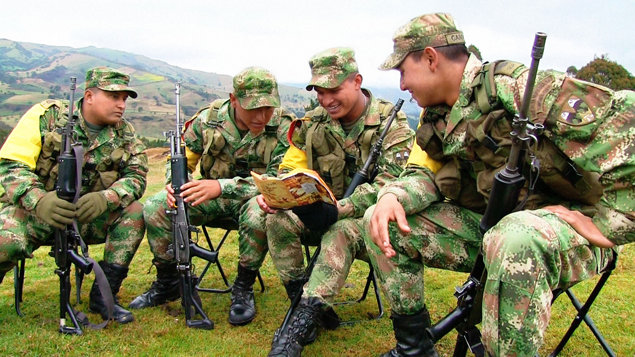
The overall effect on human rights has been nothing short of astounding. In a letter to the Foundation, the director of the Colombian military’s human rights school in Bogotá stated that the Foundation’s campaigns had contributed to a 96-percent decrease in the armed forces’ human rights violations. In September 2015, Colombia’s Ministry of Defense awarded the Foundation the [General] José Hilario López Valdés medal in recognition of their efforts to promote human rights. The prestigious award is named after the ninth president of Colombia, who abolished slavery and championed the freedom of the press in the mid-19th century.
Encouraged by the results of its human right achievements, the Foundation began a similar training exercise in neighboring Ecuador in April 2016. Security forces in Ecuador, which shares a border with Putumayo, were criticized for using force against peaceful protestors in 2015. The Foundation also launched an online app this year that allows anyone to take a human rights course and obtain a virtual certificate of completion. Military and police personnel have been among the first people to use the app.
Looking at the world’s numerous human rights challenges, Sandra and Felipe Poveda are reminded of their experiences in Putumayo, which means “gushing river” in the language of its indigenous people, and where the Foundation began its earliest work.
“We are creating a human rights culture in Putumayo, a land of war and criminality,” Felipe Poveda remarked in May this year. “If we can teach human rights here, we can teach them anywhere.”









